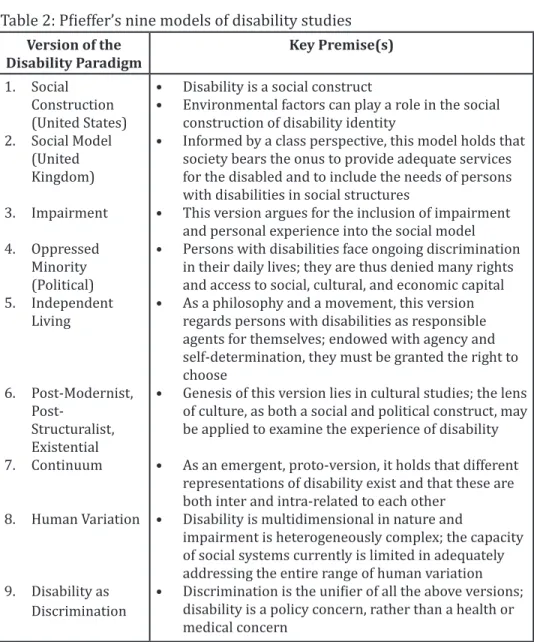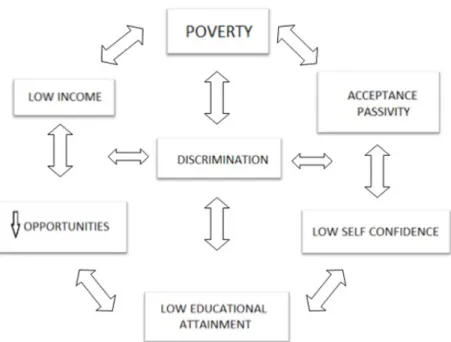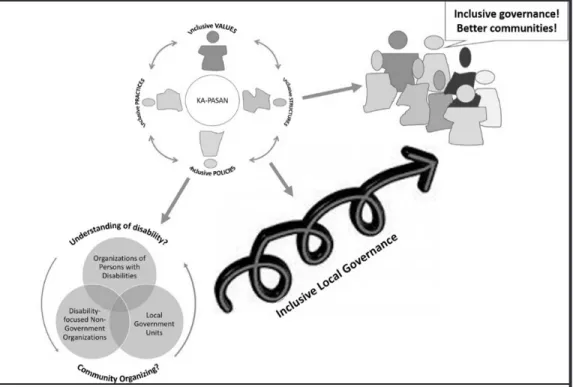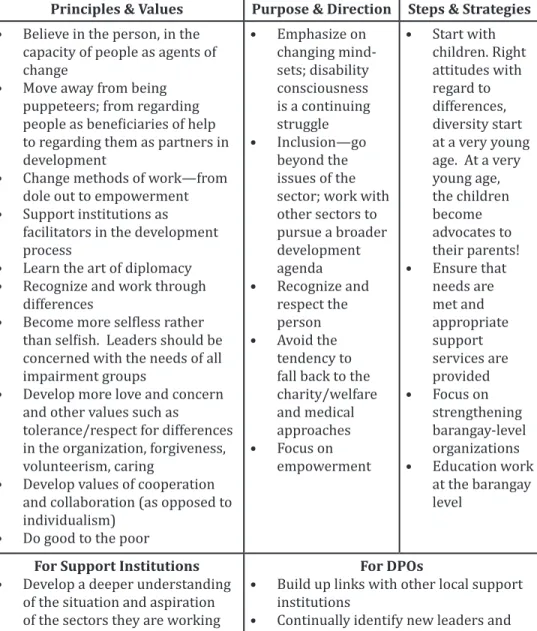Para sa MOFA, ang patuloy na pagkilos at pagtataguyod ng interes ng mga magsasaka ay isang seryosong hamon para sa organisasyon. Ang paglalakbay ng Molinete Farmers Association (MOFA) Ang Molinete Farmers Association (MOFA) ay isang samahan ng mga magsasaka sa Barangay Molinete, Laurel, Batangas. Ang organisasyon ay naging posible para sa mga mag-aaral na matutunan ang paraan ng pamumuhay sa mga magsasaka.
Ang proseso ng aktibong pakikilahok ng mga lokal na organisasyon sa pagpapaunlad ng komunidad ay mahalaga.
Engaging persons with disabilities in organizing and development work
Another leader went to LSWDO to talk about the establishment of organizations of persons with disabilities at the barangay level. The community's organizational work with disabled people should be approached from a social and disability rights-based perspective. Convention on the Rights of Persons with Disabilities: resolution / adopted by the General Assembly, A/RES/61/106.
The convention on the rights of persons with disabilities training guide: Professional training series no.

Laban sa Proyektong Hydropower sa Bontoc, Mountain Province
Mga kita ng iba't ibang kumpanyang pag-aari ng estado at mga royalty ng gobyerno para sa mga kontrata sa serbisyo ng pera. Dahil sa mga insentibong ito, ang pagkakataon ay ginagarantiyahan para sa agresibong paggalugad, pagpapaunlad at pag-deploy ng mga pribadong kumpanya sa domestic renewable energy sources ng bansa. Ang mga "proyektong pangkaunlaran" na ito ay may malaking epekto sa mga natitirang kagubatan at katutubong teritoryo ng bansa sa ilang mga komunidad.
Ang kuryenteng ito ay maaaring gamitin sa mga ilaw ng bahay, gamit ang mga kagamitang elektrikal at iba pa (APITTAKO, 2014). Ang lupain ay nagpapanatili ng mga katutubong pananaw, paniniwala at kultura, lalo na sa mga matatanda. Sa mga batong makikita sa paligid ng mga bahay, may nakabaon na inunan (umbilical cords) ng mga katutubo ng Ibontok.
Nangangahulugan ito na ang estado, sa pamamagitan ng IPRA, ay kinikilala ang mga karapatan at kakayahan ng mga katutubo na pamahalaan ang kanilang mga lupaing ninuno, kabilang ang mga likas na yaman. Ang pangunahing layunin ng kababaihan at komunidad ay ipagtanggol ang kanilang lupaing ninuno. Una, magsagawa ng mga pagpupulong-talakayan sa iba't ibang grupo sa loob at labas ng lipunan.
Ang karanasan ng pagkilos ng katutubong kababaihan laban sa hydropower project ay nagsisilbing inspirasyon para sa ibang mga komunidad. Maaaring suportahan ng mga kamag-anak ng mga sundalong ito ang pagkakaroon ng detatsment ng militar o manatiling tahimik.
Participation as Subscriptions
Re-examining participatory development practices
The demolition was part of the Marcos administration's “last campaign” to rid Metro Manila of the so-called eyesores—the squatters (Karaos, 1993; Van Naerssen, 1993). To answer this question, I draw inspiration from de Sardan's (2005) “Complex Social Logic Approach”. According to de Sardan, the approach "focuses on the analysis of the embeddedness of social logic." It moves away from the populist or essentializing (ideological) tendencies of some development theories and instead adopts a social interactionist perspective (de Sardan, 2005). The integrity and quality of the mutual relationship between "the people" and development factors depends on the cooperation of the former and the ability to survive the development configuration of the latter.
The oscillating movements surrounding the concepts of compliance, buy-in and subscriptions arise from the assumption that “people” are perceptive and calculating agents; that is, they constantly evaluate their context and accommodate possible alternatives. Perhaps the most basic implication of these concepts is directed at an individual's perspective on "the people," the mass, or the Tao. The concept of subscription, compliance and shopping underlines the implicit refusal to see people as aggregates or, as I mentioned earlier, 'people' living in the domain of normative political theory (citizens) and functionalist politics (population) (Chatterjee, 2004).
Instead, it adopts an agent-centric perspective in which "the people" are rational, judging, or calculating actors. Moreover, these concepts suggest that 'the people' are not mere objects of conscientious education, but are appropriating actors – that is, the appropriation of developmental configurations depends on their perceptions, social milieu, personal history, advantages and disadvantages of relationships. This rather dynamic reinterpretation of the characteristic of “the people” has some impact on alternative configurations of development and, to some extent, on political strategy.
16 While this may reflect populist undertones, recent political events in the Philippines and the rest of the world (ie the rise of populist regimes with authoritarian tendencies) undoubtedly lend some credence to this claim. As Deleuze & Guattari (1987) point out, "the root tree and canal rhizomes are not two opposing models." The idealization of participation and the concept of subscriptions answer different questions and can serve different purposes.
Reflections on community-engaged feminist scholarship from experiences in
The aim of the paper is to examine the FIP as a community-engaged scholarship through the parameters of being transformative, feminist and excellence-oriented. Specifically for community-engaged feminist science, its relevance to women and marginalized groups in communities is one of the most important criteria for science of excellence. Using the above parameters, this article examines the characteristics of the FIP whether it can be considered a community-engaged feminist scholarship.
Serving as the "practice" side of the graduate program, the FIP enables both faculty and students to link classroom learning to field experiences while creating an impact on the lives of women and other marginalized groups in the communities. . The FIP has three components that include: (1) a classroom-based field orientation on the academic requirements, agency and community placements; (2) actual fieldwork; (3) mid- and end-term sharing sessions of field experiences attended by the agency and faculty supervisors, representatives of community women's organizations and other faculty members of the DWDS. The FIP of the DWDS supports UP-CSWCD's brand of community-engaged science that is transformative and excellence-oriented, but nuanced by the disciplinary character of the Department – feminist in perspectives, methods and processes – in which feminist principles, values and ethics is woven into the practice and working methods of both the students and the faculty in fieldwork settings.
On the other hand, the research studies of the students became evidence-based information for the campaigns and advocacy of partner agencies and women's organizations. The practice of feminist principles, values and ethics is the cornerstone of the FIP as a form of community-engaged science. The relevance of the FIP is determined by the extent to which it responds to the needs and issues of grassroots women, the LGBT and other marginalized sectors.
At the same time, it is responsible for the students' safety, security and well-being in the field. Building capacity for community-engaged scholarship: Evaluating the faculty development component of the Faculty for the Engaged Campus Initiative.
Interrogating Poverty: Rhetoric, narratives and concepts
These definitions and descriptions are generally maintained in the development arena and are made the basis of intervention programs and projects aimed at alleviating the living conditions of the poor. To understand poverty is to go beyond definitions or to find out the extent and severity of the condition. Yes, even students, "freshies" to the CD program of the college, sometimes also give the same answers.
Common practices of data collection and analysis are often blind, if not numb, to the nuances of the daily struggles of the poor. The problem is that poverty had been so embedded in people's social, economic and political lives that its symptoms show up in their latent attitudes and behaviour. Understanding these attitudes and behaviors would require more than collecting statistical data on the living conditions of the poor.
Rather, they are an expression of the mindset of the poor, perhaps of their frustration and definitely of their acceptance. I will give you by the end of the month or by the end of the year. Because what could be worse than hearing the person who holds the highest position in the country speak to the poor with such disgust, mocking poverty in the face, in complete lack of dignity and human rights. theirs.
It is that which produces results where the people become planners and identifiers of the activities facilitated only by the students. This is what a legacy of the FIP leaves to the communities we have worked with, learned from and worked with.

Lessons from the Field Instruction Program: Learning Together,
Discussions of Power
In the same way, I strive to contribute to multiplying practitioners who will continue to put passion, commitment and enthusiasm into the CD work. FIP is a community-based internship course in undergraduate and graduate courses from the Department of Community Development (DCD) that has been running for four decades now. I want to highlight the dimensions of CD pedagogy, in connection with FIP, which deserve more conversations.
Students of CD come from different backgrounds (family circumstances, socio-economic status, motivations), which influence their work in the community. In the same way, I turn to the principles of dialogue teaching, as conceptualized by Jane Vela (2008). These are important moments in the CD process, when a new consciousness has the opportunity to turn into action.
Ultimately, however, it is through the process of living and working with the people that the FIP team can gain more clarity about the possibilities for specific CD practices in connection with fieldwork. Within the first day or two of living in the community, they would complain, "Our work is not clear to us". Freire's critical pedagogy tells us that learning about the world leads us to the role of engaging in world relations (Freire, 1998).
FIP creates opportunities where students immerse themselves in the lives of the people they serve, to be humbled by the stories of people in the community. My goal is to articulate how I put theory into practice based on the unique contexts of our work at the UP-CSWCD FIP, my interactions with my students, and our partner communities.

